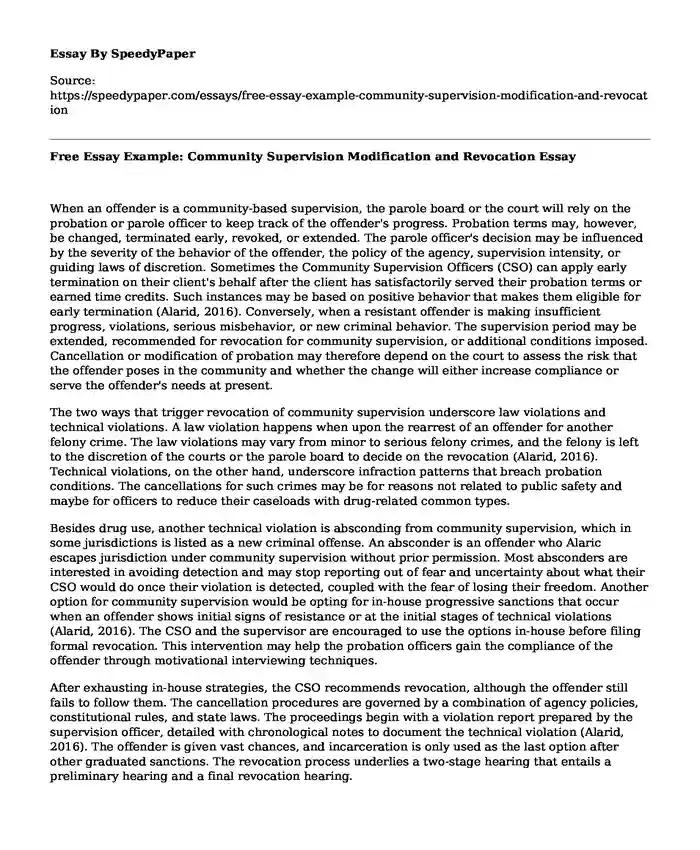
| Type of paper: | Essay |
| Categories: | Community |
| Pages: | 3 |
| Wordcount: | 744 words |
When an offender is a community-based supervision, the parole board or the court will rely on the probation or parole officer to keep track of the offender's progress. Probation terms may, however, be changed, terminated early, revoked, or extended. The parole officer's decision may be influenced by the severity of the behavior of the offender, the policy of the agency, supervision intensity, or guiding laws of discretion. Sometimes the Community Supervision Officers (CSO) can apply early termination on their client's behalf after the client has satisfactorily served their probation terms or earned time credits. Such instances may be based on positive behavior that makes them eligible for early termination (Alarid, 2016). Conversely, when a resistant offender is making insufficient progress, violations, serious misbehavior, or new criminal behavior. The supervision period may be extended, recommended for revocation for community supervision, or additional conditions imposed. Cancellation or modification of probation may therefore depend on the court to assess the risk that the offender poses in the community and whether the change will either increase compliance or serve the offender's needs at present.
The two ways that trigger revocation of community supervision underscore law violations and technical violations. A law violation happens when upon the rearrest of an offender for another felony crime. The law violations may vary from minor to serious felony crimes, and the felony is left to the discretion of the courts or the parole board to decide on the revocation (Alarid, 2016). Technical violations, on the other hand, underscore infraction patterns that breach probation conditions. The cancellations for such crimes may be for reasons not related to public safety and maybe for officers to reduce their caseloads with drug-related common types.
Besides drug use, another technical violation is absconding from community supervision, which in some jurisdictions is listed as a new criminal offense. An absconder is an offender who Alaric escapes jurisdiction under community supervision without prior permission. Most absconders are interested in avoiding detection and may stop reporting out of fear and uncertainty about what their CSO would do once their violation is detected, coupled with the fear of losing their freedom. Another option for community supervision would be opting for in-house progressive sanctions that occur when an offender shows initial signs of resistance or at the initial stages of technical violations (Alarid, 2016). The CSO and the supervisor are encouraged to use the options in-house before filing formal revocation. This intervention may help the probation officers gain the compliance of the offender through motivational interviewing techniques.
After exhausting in-house strategies, the CSO recommends revocation, although the offender still fails to follow them. The cancellation procedures are governed by a combination of agency policies, constitutional rules, and state laws. The proceedings begin with a violation report prepared by the supervision officer, detailed with chronological notes to document the technical violation (Alarid, 2016). The offender is given vast chances, and incarceration is only used as the last option after other graduated sanctions. The revocation process underlies a two-stage hearing that entails a preliminary hearing and a final revocation hearing.
Regarding the legal issues on revocation hearings, there exist rights for both the probationers and the parolees to which they are entitled, including ng and not limited to disclosure of evidence violation right to cross-examine witnesses' notice of alleged valence (Alarid, 2016). It is noted. However, revocation rates have been on the increase in recent years following the lower threshold for behavior tolerance before revocation and behavior a. Also, because increased caseload for probation officers results in stress on the officers who spend limited time with offenders and more time on paperwork, coupled with the fact that parolees have more imposed conditions that they are likely to violate.
Conclusion
In a nutshell, the offenders who have done well in supervision and have fulfilled their obligations should be rewarded with early termination. In contrast, offenders who misbehave or commit new crimes should be revoked. In response to violations with certainty and more effective results before the revocation is recommended, the CSO is encouraged to use in-house progressive sanctions guided by a decision matrix. Probationers and paroles need to be given due process rights encompassing charges notice, and rights to present shreds of evidence and confront witnesses. Finally, the increasing rate of revocation has been attributed to the lower rate of tolerance in the manner in which offenders are monitored and less time spent on treatment and concerns of reentry.
Reference
Alarid, L. F. (2016). Community-based corrections (11th ed.). Cengage Learning.
Cite this page
Free Essay Example: Community Supervision Modification and Revocation. (2023, Dec 07). Retrieved from https://speedypaper.com/essays/free-essay-example-community-supervision-modification-and-revocation
Request Removal
If you are the original author of this essay and no longer wish to have it published on the SpeedyPaper website, please click below to request its removal:
- Definition Essay Example: Community
- Free Essay Describing the Texas House of Representatives of District 65
- Essay Sample on Freeholders Meeting
- A Comparison of the Wari and My Culture Funeral Practice - Essay Example
- Free Essay on Community Development Process
- Paper Sample. The American Government and Civic Engagement
- Free Essay - The Complex Concept of African Traditional Dances
Popular categories




